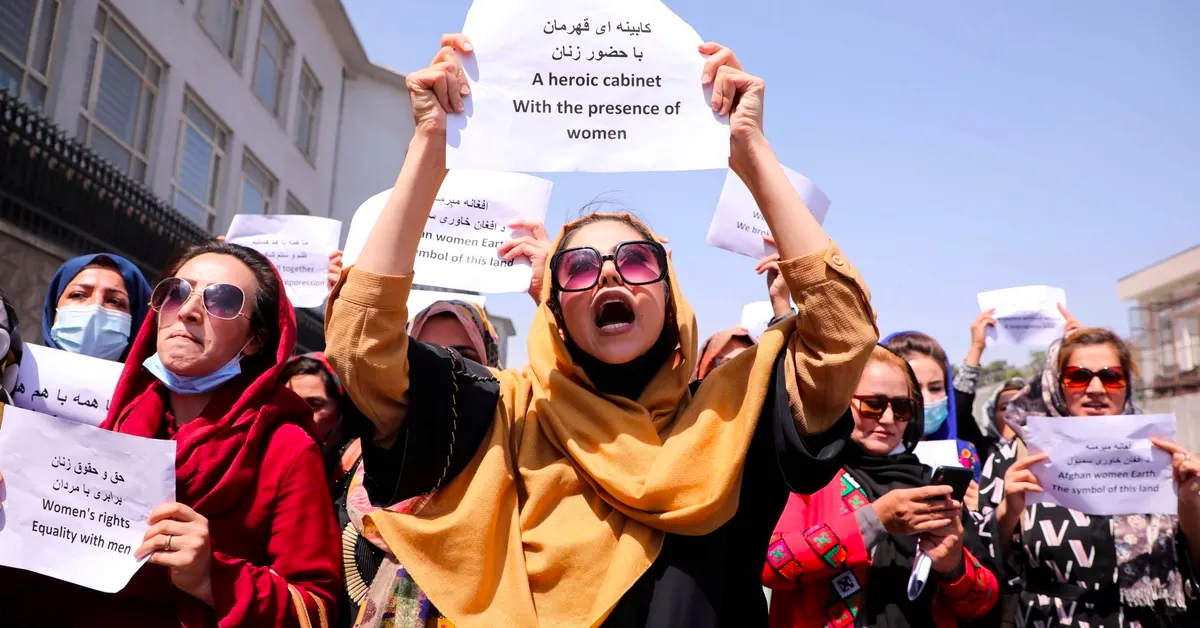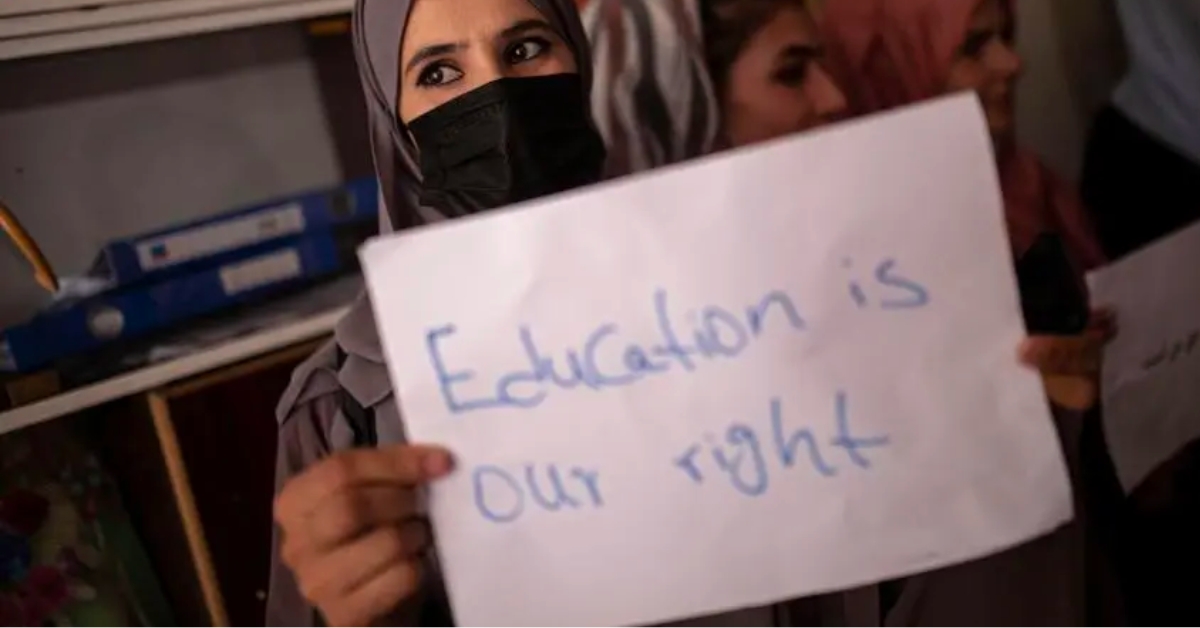Roza Otunbayeva, the leader of the United Nations Assistance Mission in Afghanistan (UNAMA), recently raised concerns about the alarming situation in Afghanistan, particularly regarding women rights.
Contents
In a poignant address, she highlighted the dire circumstances faced by Afghan women and their urgent need for protection and support.
The UN has termed the situation in Afghanistan a “gender apartheid” due to the systematic oppression of women and girls by the Taliban.
What is Gender Apartheid?
Gender apartheid is a severe and systematic form of discrimination and oppression. It draws parallels to the concept of apartheid in South Africa.
However, in the case of gender apartheid, the focus is on the widespread, systematic, and often state-sanctioned discrimination and subjugation of one gender, typically women and girls, by another, often men and boys.
Key characteristics of gender apartheid include:
Systematic Discrimination
Gender apartheid involves the systematic and institutionalized discrimination against one gender, resulting in unequal access to rights, opportunities, and resources.
Total Domination
Those in power, usually a male-dominated authority, aim to exert complete control over the lives of women and girls, limiting their freedom, choices, and autonomy.
Enforced Gender Roles
Gender apartheid enforces strict and traditional gender roles, relegating women to domestic spheres and denying them opportunities for education, employment, and participation in public life.
Restrictions on Movement
Women and girls may be severely limited in their freedom of movement, often requiring male escorts, making even simple activities, like going to school or work, challenging.
Dress Codes and Behavior
The imposition of dress codes and behavioral restrictions is common in societies practicing gender apartheid, with women and girls facing scrutiny and punishment for deviating from prescribed norms.
Limited Access to Education
Education is often denied to women and girls, or they may be subjected to a lower quality of education. It restricts their opportunities for personal and professional growth.
Violence and Control
Gender apartheid can increase violence against women and girls within and outside the family. This may include domestic violence, forced marriages, and honor-based violence.
Limited Legal Protections
Legal systems may fail to provide adequate protection and recourse for women and girls, leaving them vulnerable to abuse and discrimination.
Mental Health Impact
The suffocating environment created by gender apartheid can have severe mental health repercussions. It leads to depression, anxiety, and, tragically, suicide, particularly among those denied access to education and opportunity.
Lack of Accountability
Perpetrators of gender-based violence and discrimination often go unpunished, as legal systems may be biased against women or nonexistent in addressing their concerns.
The Two-Year Women Rights Struggle in Afghanistan
It has been two years since the Taliban took control of Afghanistan. It marks a turning point in the lives of Afghan women and girls.

During this period, the Taliban implemented a series of over 50 proclamations, orders, and restrictions. These measures have effectively created a system of mass oppression that can only be described as gender apartheid.
The United Nations has recently released a joint report. It paints a chilling picture of the systematic restrictions imposed on the women rights in Afghanistan under Taliban rule.
In a joint report to the UN Human Rights Council, Richard Bennett, the Special Rapporteur on the situation of human rights in Afghanistan, and Dorothy Estrada-Tanck, Chair of the Working Group on discrimination against women and girls. It has raised grave concerns about the treatment of women and girls in Afghanistan, describing it as the worst globally.
Gender Apartheid in Afghanistan
The report suggests that the situation in Afghanistan is gravely serious. Women and girls are experiencing severe discrimination that may amount to gender persecution, which is considered a crime against humanity.
The de facto authorities governing Afghanistan are accused of practicing systemic discrimination to subject women and girls to total domination. The term “gender apartheid” has been used to describe this relentless oppression.
Unprecedented Attack on Rights
The experts emphasize that backlashes against women’s and girls’ rights have occurred in different parts of the world in recent years. However, nowhere else has an attack as widespread, systematic, and all-encompassing as the one in Afghanistan.
Proclamations issued by the Taliban since their takeover in August 2021 have severely restricted women’s and girls’ rights, affecting every aspect of their lives.
These restrictions include freedom of movement, attire, behavior, access to education, work, health, and justice.
Rising Violence and Mental Health Crisis
The impact of these restrictions has been devastating. It has lead to a significant increase in spousal and intrafamily violence against women and girls.
The report highlights the resilience of Afghan women but also reveals their daily struggles under these repressive conditions. Following a ban on education for girls, female university students consider their gender as punishment.
Women seeking a divorce face admonishment from judges who question their reasons, further perpetuating their vulnerability.
Gender Persecution as a Crime Against Humanity
The experts are deeply concerned that gender persecution is occurring in Afghanistan under the de facto authorities, constituting a crime against humanity under the Rome Statute.
The ban on female education sets Afghanistan apart. It is the only country where girls and young women cannot attend secondary and higher education institutions.

This affects employment opportunities and access to essential services such as healthcare.
Suffocating Environment and Mental Health Impact
Women in Afghanistan are now prohibited from working outside the home in most sectors, leaving their homes without a male relative (Maharam). It is difficult for them to access public facilities, parks, and gyms, or move freely around the country.
This suffocating environment has had severe mental health repercussions. There were widespread reports of depression and suicide, especially among adolescent girls deprived of education.
Legal Protections Absent
The report also highlights the absence of legal protections for women and girls, systematic discrimination, and the normalization of gender-based violence.
This includes gender-related killings, forced and child marriage, selling children and body organs, child labor, trafficking, and unsafe migration.
The lack of a clear and predictable legal system contributes to violence against women and the absence of accountability for perpetrators.
Women have no access to women legal professionals. Some women lawyers cannot enter courtrooms in most locations.
The Call for International Action
The UN experts have called on the de facto authorities in Afghanistan to respect and restore women’s and girls’ human rights.
They urged international involvement. They called for concrete steps to support accountability for rights violations. The report is a stark reminder, highlighting the urgent need to address the Afghan crisis.
The international community must work collectively to protect the rights and dignity of Afghan women and girls.
Conclusion
The plight of Afghan women and girls remains a pressing humanitarian crisis. The UN’s appeal for a “Gender Apartheid” declaration in Afghanistan highlights the situation’s urgency. It solicits the need for collective action to protect the Afghan women rights.
The international community needs to prioritize the well-being of Afghan women. They must support their struggle for equality and dignity in the face of oppressive conditions.
